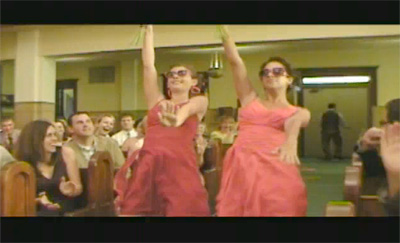

The JK Wedding Entrance Dance
Mary Rose Bacani Valenti
Wednesday, August 12, 2009

A lot of you may have seen this on YouTube already, because it’s gotten quite popular. It’s called JK Wedding Entrance Dance. The wedding is in a church at St. Paul, Minnesota, and the whole wedding party dances to Chris Brown’s song “Forever” as they walk down the aisle towards the altar.
This has gotten so popular that since its posting on July 19th, it’s had almost 19 million hits. That’s one incredibly popular video! I thought it was a fun video myself.
Why am I bringing it up now? Well, I decided to cruise through some of the comments on the video. Comments like this, although slightly reworded:
- “This is great because people should look happy and not so solemn like most wedding processions. If God is love, wouldn’t he want you to act happy?”
- “There is no Scripture passage that says the wedding is a religious service, nor is the building it takes place in have to be holy ground, so this is not inappropriate nor disrespectful at all – it’s great.”
- “Dance is one of the oldest forms of human expression and should be used as a vital part of most ceremonies.”
- “This is so great and so spontaneous, I want my wedding procession to be just like it.”
Dear Mary Rose, Allow me to give a two-fold pastoral response. First, getting married (or professing final vows) is a nerve-racking event. Most grooms barely say the words ‘I do’ loud enough so that you can hear them. I can’t even imagine asking them to dance down the aisle. It’s just too much pressure! Some could handle it; others would vomit or freeze up. Second, dancing can be a genuine form of praising God. Look no further than the Exodus event: “When Pharaoh's horses, chariots and horsemen went into the sea, the LORD brought the waters of the sea back over them, but the Israelites walked through the sea on dry ground. Then Miriam the prophetess, Aaron's sister, took a tambourine in her hand, and all the women followed her, with tambourines and dancing. Miriam sang to them: ‘Sing to the LORD, for he is highly exalted. The horse and its rider, he has hurled into the sea.’" However, with any celebration we must ask ourselves, “What memory do I want to create with this celebration? And how can my actions contribute towards that memory?” At a wedding, you want people (especially the couple) to remember the vows and God’s blessing upon those vows. This is the memory that will help sustain a couple in good times and in bad. I have no problem with people adding joyful movement to the liturgy – joy is a sign of the Holy Spirit – but it should contribute, not overwhelm, the focus and lasting memory of the celebration. Is there a YouTube video about the vows too?My other good friend Fr. Chris who is presently in the Detroit area adds this:
Dear Mary Rose, If people think that most brides walking down the altar don’t look too happy, they are right! But couldn’t that be because most people get caught up in preparing for less important things for the wedding? And joy shouldn’t be judged merely on the external – joy comes from within. A bride could be going down the aisle with the deepest joy and most wonderful relationship with Christ that doesn’t come off as externally “exciting” for people today. And I agree with Fr. Glenn – we have to ask ourselves, what do we want people to remember from our wedding? Do we want them to remember our wedding entrance, or something else?So, I ask you, what are your thoughts? How would you respond to Fr. Glenn and Fr. Chris?
Categories:
Related Articles:
<<













